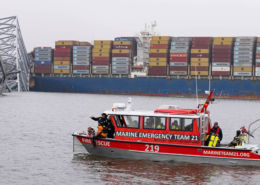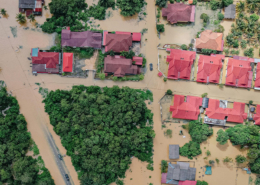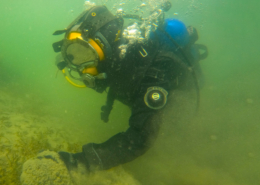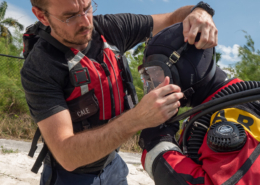Proper Procedures for Interviewing Witnesses at Dive Environments
By: Michael S. Glenn
Each dive scenario is unique and challenging. Every target presents its own concerns and needs. Every environment is unique in its own right. As such, Paramount to the success of any dive operation is an understanding of what actually occurred and what specifics need to be addressed within the environment.
An understanding of the events and mechanics of the incident will aid the emergency response divers in planning their dive operation mode, plan for safety mitigation and understand the target and the myriad of potential concerns associated it. For this purpose, dive teams must address how to approach and manage the initial and best source(s) of available information. These can include:
- Witnesses and bystanders
- The initial caller
- Friends and family members present
- Innocent individuals on scene
All can supply invaluable information to make the dive mission a success for all parties involved.
Potential witnesses are crucial
Potential witnesses are crucial to the success of any dive operation and safe management of the scene. As the emergency response divers are seldom present when an incident occurs, witnesses can provide a plethora of helpful information to aid the dive team in understanding exactly what has occurred. Some of the potential information which may be obtained includes, but is not limited to:
- Who or what the target is
- Where the target was last seen prior to submerging
- Any and all events which led up to the incident occurring
- Local water history and potential hazards
- Local resources, if known, that may aid in the successful completion of the dive.
Begin with the caller
The initial and best source to begin is with the actual caller, who reported the matter. Routinely, the caller is someone who was on scene at the time the incident occurred and has firsthand knowledge of the events. The caller can narrow the search area by pinpointing where the victim was last seen before submerging or where the body was seen being disposed.
The caller can also supply information on what the drowning victim was doing prior to the unfortunate occurrence or even where evidence was disposed of. It is crucial to speak with this person and attempt to harness all available information.
Mens Rea and Actus Reus
The information obtained may assist with providing two key components of any criminal investigation: Mens Rea (mental intent) and Actus Reus (physical act of the incident). While these two terms are generally associated with criminal investigations, it is important to note that all underwater incidents do fall, in some form, under criminal investigations as spelled out in the Emergency Response Diving ERD I course.
When witnesses are available, dive team members should take the time to discuss what the witnesses know prior to engaging in any operation. Performing in-depth interviews may:
- Speed the recovery time
- Aid in locating the target
- Minimize exposure and risk
- Aid in potential future reconstruction and testimony issues.
However, there are basic techniques necessary to avoid potential confusion and contamination of testimony.
Techniques necessary to avoid potential confusion and contamination of testimony
Dive team members should have several topside support personnel assigned to interviewing witnesses. The dive manager and primary tender would be appropriate choices for this endeavor as they are ultimately the individuals tasked with the direction of the divers and establishing the dive mode for the specific mission. Their individual understanding and direction may help divers get on target quicker and safer.
Whenever it is possible, emergency response dive members tasked with interviewing witnesses should separate these individuals. Dive team members need to understand that how they approach and talk to witnesses will ultimately determine how responsive these individuals can be. Dive team members should be polite, courteous and empathetic to the witnesses, as some may be intimately connected with victims. They may also be concerned owners of property or simply concerned individuals.
It is imperative that these individuals be treated with the utmost professionalism and care in order to make them actively willing to divulge information. Unprofessionalism reflects poorly on the individual interviewer and team but may also aid in shutting down an open exchange of information between the dive team member and the witness.
Separating witnesses may seem an easy task to perform
However, sometimes witnesses are not comfortable being pulled away from friends and family. However, when two or more individuals are left together they seem to revisit the incident in their discussions and sometimes, often, recreate flawed recollections of what has occurred.
In these incidents these groups can create a common story. They will provide statements about information that they did not readily witness. This is referred to as contamination of the statement. As such, separating these individuals can minimize cross contamination and provide for a more accurate reflection and recollection from memory.
How to perform an interview
When conducting interviews, interviewers should be calm and engage in active listening. When applicable, restate what the witness has stated, in the diver’s own words, but paramount allow the witness to do the majority of speaking.
Dive team interviewers should ask open ended questions in order to allow the witness to explain what they have seen. Interviewers should avoid using simple yes and no questions, unless specific to a key point. Open ended questions would include:
- Can you tell me what happened?
- Do you know who was involved?
- Can you tell me where you last saw them/the object, before it submerged?
- What were you doing prior to the incident occurring?
Allowing the witness to tell what occurred will provide a more thorough picture of the incident in question. Further, the interviewer should make proper notes about the information provided and revisit specific points in order to maximize the information obtained.
While witnesses can elaborate on the specific information of a dive incident, they can also be a wealth of knowledge regarding the actual dive environment. As many local waters are regular vacation or recreation spots, local witnesses can supply historical, topographical and even potential hazards unknown to the dive team. Further, as dive teams often respond to locations outside their normal jurisdiction, the information gathered from witnesses may become invaluable in mitigating safety and exposure concerns.
For the purposes of investigative needs, future recall and potential litigation concerns, all witness statements should be recorded in either written or video form. Interviews should include the witnesses name, contact information and potential relationship to the case. Written interviews should be signed by the witness and included in the investigative report.
Witnesses are the only immediate source of information available to the dive team and individual team members. Their wealth of firsthand knowledge is undeniable and crucial to the success of the operation at hand.
As such, taking time to carefully separate these individuals and harness the information that they possess is crucial to resolving the incident at hand. Taking the time to be compassionate and professional can open the doors to successful communication and understanding. It allows everyone associated with the operation to access the information readily available.
Improper attempts may close down lines of communication, making the endeavor far more challenging than necessary. By utilizing proper procedures for interviewing witnesses at dive environments emergency response divers may be more prepared, proficient and professional when conducting their specific operation.
Emergency Response Diving International has expanded information on this topic in the ERD I Operations course.


 Photo By: Defense Visual Information Distribution Service
Photo By: Defense Visual Information Distribution Service


 Y. ZIN
Y. ZIN


Dodaj komentarz
Chcesz się przyłączyć do dyskusji?Pomóż nam się rozwijać!